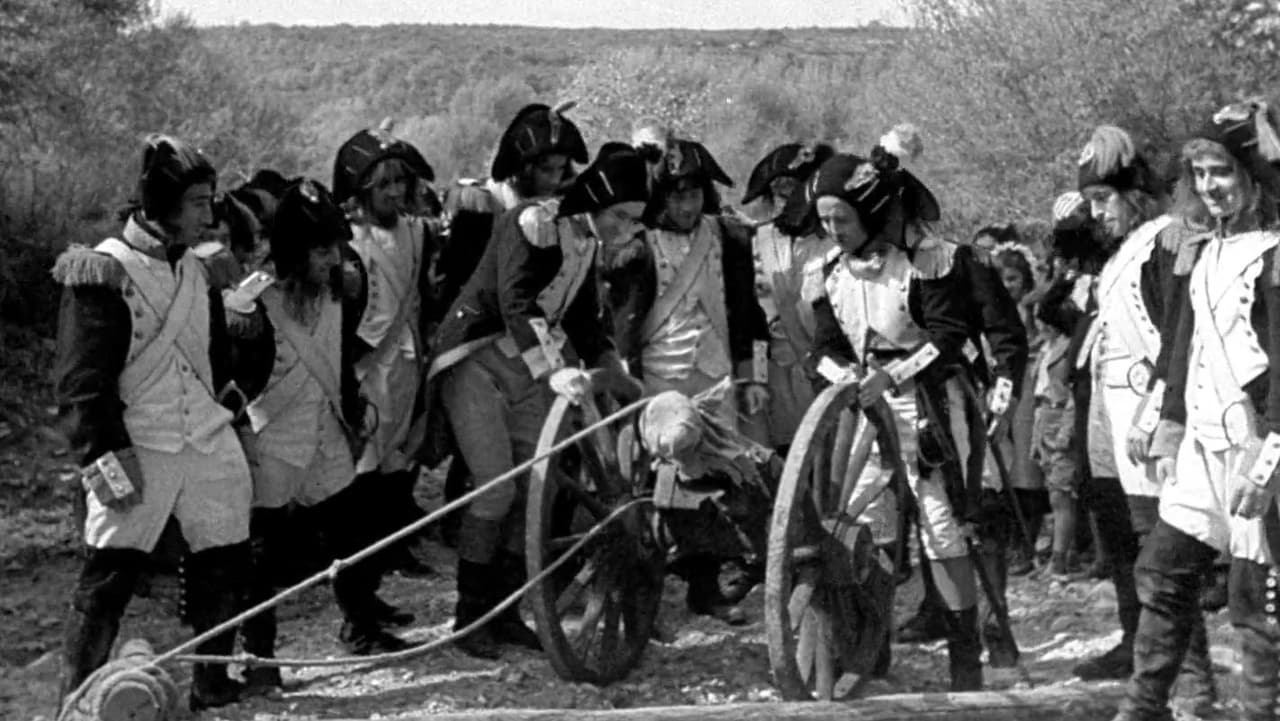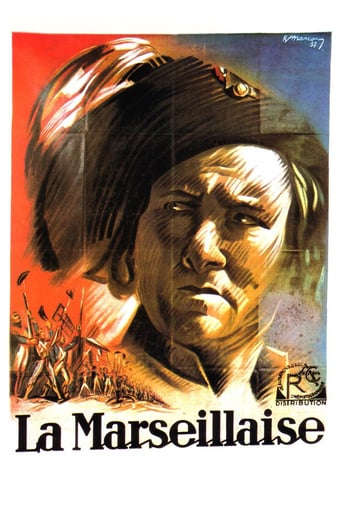

Good concept, poorly executed.
... View MoreIt is not only a funny movie, but it allows a great amount of joy for anyone who watches it.
... View MoreExactly the movie you think it is, but not the movie you want it to be.
... View MoreIt is encouraging that the film ends so strongly.Otherwise, it wouldn't have been a particularly memorable film
... View MoreLa Marseillaise takes place during the phase of the French revolution that was the most optimistic and the least bloody. Director Jean Renoir is concerned with how this moment is viewed by both the monarchy in Paris and the everyday people of Marseillaise who march to Paris singing their song (Battle Hymn of the Rhine Army). His presentation is realistic and probably more accurate than most films that have dealt with the subject.La Marseillaise has been proclaimed as a masterpiece but, while I liked the film, I cannot share in that acclaim. Jean Renoir is considered one of the (if not THE) greatest French directors in film history. I love The Rules of the Game, but have found many of Renoir's other films slow going. This is true of parts of La Marseillaise as well. The running time is 132 minutes; there is (intentionally) no main protagonist; an assumption is made that the audience knows more about the historical events than some viewers (like me) may.Despite some restlessness on my part, La Marseillaise remains a worthwhile film. Every Jean Renoir film has wonderful moments, La Marseillaise especially. My favorite is Louis XVI's long walk with his family to Parilament. Renoir uses a crane shot to view the pedestrians. The dejected look on the King's face is powerful. He and his son share a reflexive moment over fallen leaves. This scene powerfully contrasts with the buffoonish way Louis was portrayed at the beginning of the film. This is a perfectly made scene. The film has other great scenes as well. Although it did not affect me as deeply as it has others, I would recommend La Marseillaise, especially to French film admirers, students of Jean Renoir, and history buffs.
... View MoreLa Marseillaise depicts lesser known stories attached to the events in Versailles in 1789 which led to the downfall of the monarchy. Renoir continues with a consistent stylistic system - great depth of field, two-shot closeups, framing of crowds, mobile framing, polyvocal (accents). In fact, aristocrats and citizens receive the same treatment from the camera. The exception is with the King and Queen who receive one-shot closeups, however, this seems more in the service of a dialectic regarding the Brunswick Manifesto than it being about psychological identification. This story is symbolic and likely the symbolism and abstraction is what led to the film not being as popular as was expected. There is also a confusion for the spectator because of Renoir's humanist treatment. Bumpkins are charming, aristocrats are accepting and armies more or less fight together instead of against each other. Renoir often spoke out against violence in film and this might be another disappointment for audiences at the time. Most violence is dissuaded through crafty acts of oration. The brains over brawn theme certainly lacks something of the 'common touch'. The breaking down of the song into parceled quotations reminds of the French New Wave's often lyrical and intellectual modes of expression. There is a monarchist rhetoric that runs through the film regarding order versus anarchy... yet there is little example of anarchy but also no false reprisal by monarchists against citizens. The treatment of war is tepid, but it just goes to show that Renoir was never comfortable representing hardened political positions.
... View MoreComing as it does between the much better-known and acclaimed La Grande illusion and La Bête humaine, it's not surprising that this epic story of the French Revolution told mostly from the point of view of several peasant and laboring-class men who find themselves (mostly uneasily) caught up in the events of the early part of the revolt would get glossed over by many film historians. And it's not quite on the level of those masterpieces nor of La Règle du jeu from the following year or for that matter most of Renoir's 40s and 50s output, but it's also hardly worthy of dismissal.The film begins in the countryside and the Mediterranean port city of Marseilles, as a middle-aged man is about to be tried (and presumably executed) for the killing of a pigeon on his lord's land. He instead escapes into the country, into the mountains, where he meets up with with other like-minded impoverished proto-rebels. Slowly over the course of the first half-hour the struggle takes on political tones rather than just the personal gripe of one man, and it is the genius of the film to keep slowly building to the inevitable climax of "The Nation" versus "The King" while never forgetting to regard participants also as individuals.By the middle of the film the royal family and nobles have begun to understand the dangers they face, or at least some have -- the king still ignores the growing strife -- and they begin to play a major role in the film. Interestingly, the prime revolutionaries themselves though mentioned never take the stage; the focus is always on the lowest and the highest members of society, with the intellectuals who fomented the events offstage. Renoir is, it seems, trying to tell us that events were inevitable, and the prime movers really aren't all that significant if we look at the lives of those who stood most to gain, or lose.The final battle sequences are impressively staged, the film as a whole is strikingly well-acted and pretty seamless for all its shifting of focus between the oblivious king and his progressively angrier subjects. Particular acting honors would go to Edmond Ardisson as Bomier, whose growing beginnings of an understanding that revolution is not merely about him, but about the whole world around him are very moving. Pierre Renoir as Louis XVI manages to be foolish, brutal, and sympathetic by turns.
... View MoreJean Renoir's classic tribute to the glory of the French Revolution, the film captures the personal flavor of the struggle and the philosophical background to the revolutionary upheaval. In a rapid series of vignettes we are introduced to the elegance and nobility of the court of Louis XVI and Marie-Antoinette... the contrasting plight of French peasants governed by laws they cannot understand...the storming of the Bastille in 1789 by an undisciplined mob...the plotting of France's exiled nobility to return to power...the Republican march on Paris...and the capture of the Tuilleries in 1793, ending the revolution. The film follows the adventures of two young patriots who join the Peoples' army in Marseilles. As their battalion begins its long journey north to Paris to join with the Federate army, they adopt as their anthem a song from the Army of the Rhine. This song was soon to be known all over France as "La Marseillaise" and would lead the newly unified nation to victory.
... View More